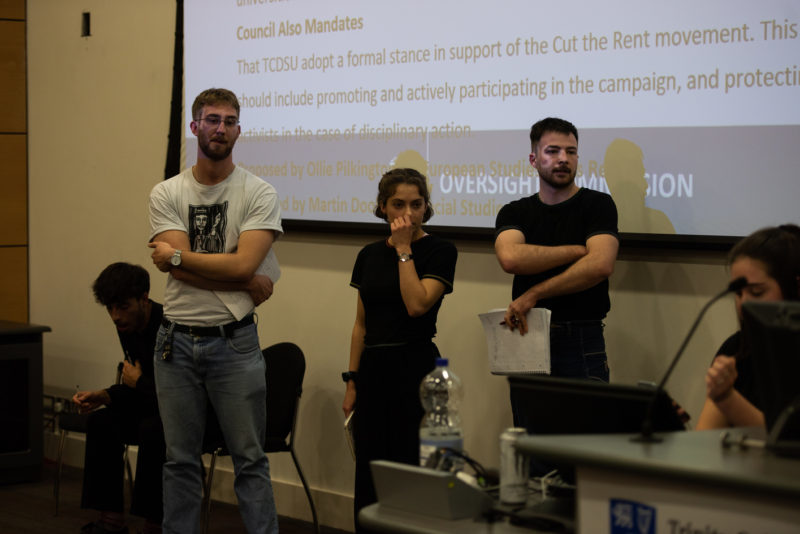At a meeting this week, activist group Cut the Rent opted not to go ahead with a planned rent strike on campus in January. The news was met with a surprising lack of uproar.
When Trinity College Dublin Students’ Union (TCDSU) council initially voted not to support rent strikes (before U-turning a month later) students were outraged. But Cut the Rent’s decision to not launch the campaign it was set up to organise didn’t seem to ignite similar anger among students.
When Cut the Rent was set up, it seemed like its sole purpose was to organise a rent strike. Striking, then, was not only fundamental to its mission, but to its existence. If Cut the Rent isn’t going to rent strike, then it’s not clear what exactly it’s there for.
Using the excuse of building for a bigger rent strike next year is exactly that – an excuse. If the group cannot execute its one fundamental purpose, then why should students trust it to orchestrate a campaign that could become one of the biggest student protests in recent years?
Students’ unions and political groups have made student accommodation a priority in recent years, but it’s hard to argue that they’ve had much success. It is obvious that more dramatic action is needed. And if Cut The Rent aren’t going to be the ones to mobilise students in this action, then students should be banding together and looking for alternative ways to carry out a rent strike.
The longer an organisation goes without acting, the more likely it is to get tied up in bureaucracy and administrative decisions that impede the achievement of its aims
There is no point waiting for a rent strike next year that could be indefinitely delayed or postponed. The longer an organisation goes without acting, the more likely it is to get tied up in bureaucracy and administrative decisions that impede the achievement of the aims it was established to fight for.
Cut the Rent’s justification – that not enough students were willing to participate – also feels amiss. It has made the decision just weeks after securing the support of both the Union of Students in Ireland and TCDSU – a major success, and one that its members worked hard for. Surely now is the time to capitalise on union backing?
Rent strikes are certainly a risk, but every grassroots movement needs a few people to go the extra mile at the very start to build momentum before others feel able to join in. Many of the biggest campaigns in history started small: from Irish independence to Greta Thunberg, it has been proven time and time again that if your idea is radical enough and your conviction strong enough, a small group of people can ignite a real movement and drive for change.
But Cut the Rent blinked under the spotlight, opting to kick the can down the road. Students should not accept this as a reason to stop looking for radical ways to fight against rising – and crippling – accommodation costs.
And rent strikes, while a radical move, aren’t an untested method – they’re an action with a record of success. Students in University College London achieved a rent freeze on its lowest rents, as well as an increase to its accommodation bursary, following a five-month rent strike in 2017. The number of students involved might not yet be the same as the 200 that refused to pay their rent in London, but there’s nothing like radical action to gain publicity and build support.
If your idea is radical enough and your conviction strong enough, a small group of people can ignite a real movement and drive for change
In addition, by putting off a rent strike, Cut the Rent has dealt its own credibility a major blow: its rhetoric about urgent drastic action being required now sounds dispiritingly empty. The postponement of the strike means that the group has lost any momentum it might have had. Is Trinity really going to take a supposedly “radical” group seriously if it doesn’t even have the conviction to go through with a strike on its initial planned date?
It gives the group a lack of credibility, and hence a lack of negotiating power. This move is a start on the wrong foot, and may set the movement back further than its members realise.
It is clear that the time is ripe for dramatic action against exploitative student accommodation prices. Students are angry and frustrated – and desperate for a solution. The reasons for the low willingness to participate should be examined and considered, but all rhetoric and no action is the perfect recipe for failure. There’s never a perfect time for a radical action.
If inclusion is an issue, that needs to be dealt with. But participation breeds participation, and success breeds momentum. A small group striking is markedly better than no striking at all. Cut The Rent’s members had the potential to start a revolutionary movement for Irish students. By cancelling the strike, they’ve shortchanged themselves – as well as the students being ripped off by extortionate accommodation costs.







